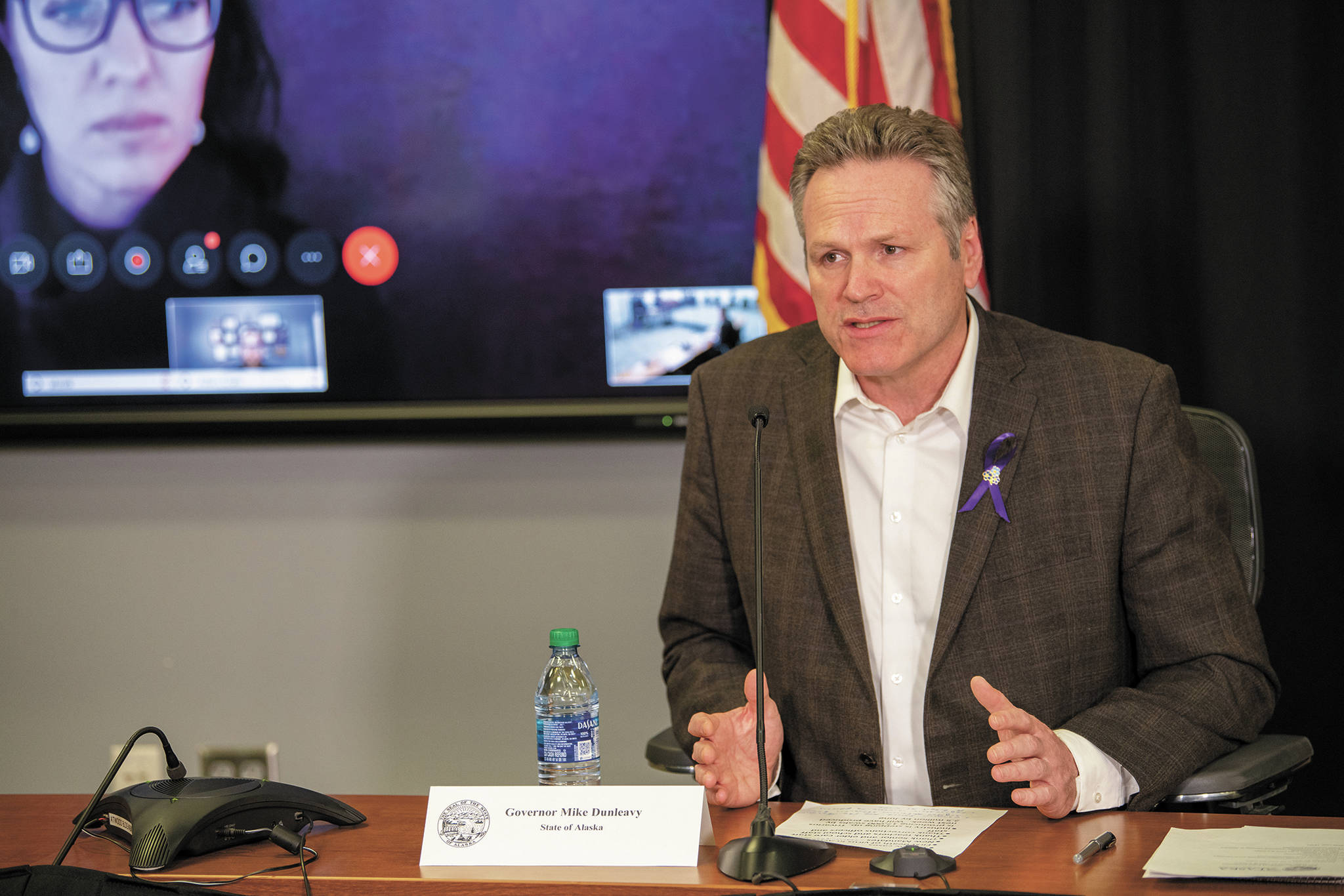Two new statewide mandates shutting down non-essential businesses and prohibiting traveling between communities went into effect Saturday.
The new health mandates, which were announced by Gov. Mike Dunleavy during a press conference Friday, are similar to other shelter-in-place, hunker down and stay-put orders enacted across the nation to slow the spread of COVID-19, the disease caused by the new coronavirus.
The new statewide mandates shut down any non-essential business and organizations and prohibit Alaskans from traveling outside their community unless it’s for a critical reason. The mandates do not prohibit residents from being outside, but those who go outside on walks must practice social distancing.
“You can still go out and snowmachine, four-wheel, walk your dog, jog, hike, ski, do whatever you want to do outdoors but stay 6 feet away or more,” Dunleavy said.
Mandate 11, which shuts down non-essential businesses, will be re-evaluated April 11. Mandate 12, which prohibits any in-state travel between communities, will be re-evaluated April 21.
“The next two weeks are going to be critical to slowing this virus,” Dunleavy said.
Dan Nelson, emergency manager for the Kenai Peninsula Borough, told the Clarion on Saturday that, from his reading of the mandates, the governor is stepping up the response to the virus while continuing to allow for “generous flexibility” in living a normal life. The mandates do not mean that Alaskans should expect to see things like checkpoints on the roads, Nelson said, but it does signify a significant increase in how seriously the state is taking the outbreak.
“My interpretation is that there’s an ability to maintain some degree of normal life, but the over arching focus is truly, let’s isolate and stay inside as much as possible to flatten the curve,” Nelson said.
Mandate 12 went into effect Saturday at 8 a.m. and prohibits any in-state travel between communities, unless the travel is to “support critical infrastructure” or for “critical personal needs,” which include buying groceries or other necessities, fueling vehicles or other essential needs.
Mandate 11 went into effect Saturday at 5 p.m. and shuts down non-essential businesses “in order to prevent, slow and otherwise disrupt the spread of the virus.” It also mandates that all Alaskans not involved in essential health care, government or business services remain at their place of residence and practice social distancing.
Social distancing means staying at least 6 feet away from another person.
In response to Mandate 11, Central Peninsula Hospital announced Saturday that visitors will no longer be permitted in the hospital except under certain circumstances, such as a minor with a developmental disability who requires assistance, or end-of-life visitations.
Businesses and employees of essential infrastructure industries must, “to the extent reasonably feasible,” protect their staff and operations during this pandemic, the mandate said. The document also mandates Alaskans “work from home as much as possible.” The mandate prohibits any public or private gatherings of non-household members, regardless of the size of the group.
Essential infrastructure employers must submit a travel plan or protocol for maintaining critical infrastructure to akcovidplans@ak-prepared.com. The plan should outline how the work will avoid the spread of COVID-19.
Essential infrastructure includes emergency operations and health care operations as well as veterinary care services. Businesses providing services or operations and maintenance to the Port of Alaska, public works construction, construction of housing, airport operations, water, sewer, gas, electric, oil production, mining, logging, roads and highways, public transportation, solid waste collection and removal, internet and telecommunications systems are considered essential. Financial services are also considered essential.
Restaurants and other businesses serving food can still serve through delivery and carry out. Local grocery stores, food banks and convenience stores that sell food are considered essential, as well as any business providing food, shelter, social services and other “necessities of life” for the “economically disadvantaged.” Gas stations, auto-supply and repair shops and hardware stores can stay open. Plumbers, electricians, exterminators are considered part of maintaining critical infrastructure. The post office will remain open, along with laundromats and dry cleaners. Media services, like newspapers, television and radio are also considered critical.
Violation of the mandate could result in a business or organization receiving an order to cease operations and/or a civil fine of up to $1,000 per violation.
Dunleavy also announced Friday the first person in state to die of COVID-19. The state also reported on its website Saturday that six people are now hospitalized for treatment.
As of Saturday evening, statewide there were 102 cases of COVID-19, according to the website for the Division of Health and Social Services. Nearly half of the state’s confirmed cases, 54, were in the Anchorage area — including Joint Base Elmendorf-Richardson, Girdwood and Eagle River/Chugiak.
During his press conference Friday, Dunleavy addressed the medical supply shortages both in the state and nationwide. He said Palmer company TriJet Manufacturing Services will be producing 17,000 swabs that can be used to take test samples by next week. He said the company will ramp up production and that by June, there should be 2.5 million of the swabs in Alaska.
The Palmer manufacturing company is not the only one stepping up to produce needed supplies, either, Dunleavy said.
“It’s a battle with an invisible enemy,” Dunleavy said. “It’s going to be a fight for several weeks and potentially several months.”
You can read both of the new mandates in their entirety here: http://dhss.alaska.gov/News/Documents/press/2020/FAQs_03272020-SOA-COVID-19-Health-Mandate-011-012.pdf
Clarion reporter Brian Mazurek contributed to this report.
Reach Victoria Petersen at vpetersen@peninsulaclarion.com.

